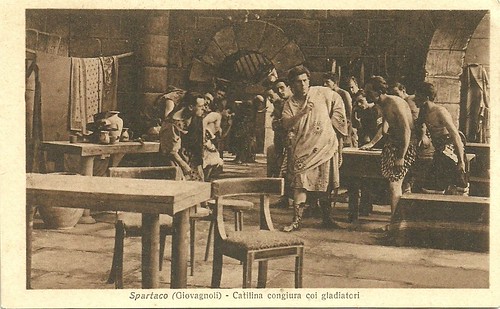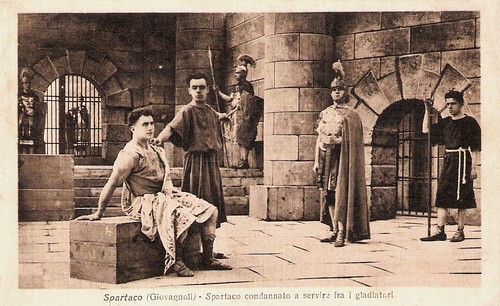Il Cinema Ritrovato 2013, the Italian festival dedicated to the rediscovery of rare and little-known films begins today. We're in Bologna, and for 8 days, European Film Star Postcards will post about stars and films of this wonderful festival of film restauration. We start the 27th edition of Il Cinema Ritrovato (29 June - 6 July 2013) with the silent Italian epic Spartaco - Il gladiatore della Tracia/Spartacus (Enrico Vidali, 1913). It will be shown on Friday in the section One Hundred Years Ago: Glorious 1913.

Italian postcard by V. Uff. Ref. St., Terni, no. 4228. Photo: Pasquali Film, Torino. Publicity still for Spartaco – Il gladiatore della Tracia/Spartacus (1913). Caption: Il Senato vota solenni funerali a Silla (The Senate votes to hold a solemn funeral for Silla).

Italian postcard by V. Uff. Ref. St., Terni, no. 4233. Photo: Pasquali Film, Torino. Publicity still for Spartaco – Il gladiatore della Tracia/Spartacus (1913). Caption: Catilina congiura coi gladiatori (Catilina conjures with the gladiators).

Italian postcard by V. Uff. Ref. St., Terni, no. 4234. Photo: Pasquali Film, Torino. Publicity still for Spartaco – Il gladiatore della Tracia/Spartacus (1913). Caption: I lorari tolgono dal Circo i cadaveri dei gladatori (The corpses of the gladiators are taken from the Circus by the lorari = taskmasters or slave drivers).

Italian postcard by V. Uff. Ref. St., Terni, no. 4231. Photo: Pasquali Film, Torino. Publicity still for Spartaco – Il gladiatore della Tracia/Spartacus (1913). Caption: I giovani patrizi si arruolano contro Spartaco (The Young patricians conspire against Spartacus (Mario Guaita-Ausonia)).

Italian postcard by V. Uff. Ref. St., Terni, no. 4229. Photo: Pasquali Film, Torino. Publicity still for Spartaco – Il gladiatore della Tracia/Spartacus (1913). Caption: Valeria si intrattiene con Mirza parlando di Spartaco (Valeria sits with Mirza, talking about Spartacus). Spartaco's sister Mirza (Cristian Ruspoli) has become the slave of Crassus' sister Valeria (Maria Gandini). Valeria gets interested in Spartacus because of what Mirza tells about him.
Romantic Love Conquers Political Conflict
Spartaco - Il gladiatore della Tracia/Spartacus (1913, released early 1914) was a prestigious production by the pioneering Pasquali studio. Mario Guaita-Ausonia played Spartacus and this role was his international breakthrough. Director Enrico Vidali had co-acted with Ausonia in Sui gradini del trono/On the Steps of the Throne (Ubaldo Maria Del Colle, 1912), and had already directed him in L’ultimo convegno/Under Suspicion (Giovanni Enrico Vidali, 1913). The Italian film journal Vita cinematografica praised Guaita for ‘the plastic beauty of his appearance, the attraction and at the same time the power and swiftness of his perfect body, his penetrating glance, and his perfect acting.’ And in American publicity he was described as ‘a celebrated Italian wrestler and fine actor, whose physique and finely chiseled face make him an extraordinary prototype [sic!] of the ancient gladiator.’ Actually in Spartaco the camera is often focusing on Ausonia’s naked chest, his muscular arms and his stern look into the camera. The film was strongly based on the novel by Raffaello Giovagnoli on Spartacus, but where the hero dies on the battlefield in the novel, Ausonia’s Spartacus reconciles with Crassus and marries his daughter. So romantic love conquers political conflict - at least in the American version of the film.

Italian postcard by V. Uff. Ref. St., Terni, no. 4224. Photo: Pasquali Film, Torino. Publicity still for Spartaco – Il gladiatore della Tracia/Spartacus (1913). Caption: L'amore di Spartaco per Valeria - Metrobio all'agguato (The Love of Spartaco for Valeria - Metrobio plots a trap).

Italian postcard by V. Uff. Ref. St., Terni, no. 4232. Photo: Pasquali Film, Torino. Publicity still for Spartaco – Il gladiatore della Tracia/Spartacus (1913). Caption: Il giuramento della Lega degli oppresi (The Oath of the League of the oppressed). The gladiators swear loyalty to Spartacus.

Italian postcard by V. Uff. Ref. St., Terni, no. 4226. Photo: Pasquali Film, Torino. Publicity still for Spartaco – Il gladiatore della Tracia/Spartacus (1913). Caption: Crasso muove contro Spartaco fra i saluti del popolo festante (Crassus moves against Spartacus amongst the celebrating people). Eventually Spartacus will beat Crassus (Enrico Bracci).

Italian postcard by V. Uff. Ref. St., Terni, no. 4235. Photo: Pasquali Film, Torino. Publicity still for Spartaco – Il gladiatore della Tracia/Spartacus (1913). Caption: I gladiatori discendono dall'accampamento del Vesuvio (The gladiators descend from their camps at Mount Vesuvius).

Italian postcard by V. Uff. Ref. St., Terni, no. 4227. Photo: Pasquali Film, Torino. Publicity still for Spartaco – Il gladiatore della Tracia/Spartacus (1913). Caption: Spartaco condamnato a servire fra i gladiatori (Spartacus condemned to serve among the gladiators).
Sources: Vittorio Martinelli (Maciste & Co), Thomas Späth, Margit Tröhler (Spartacus – Männermuskeln, Heldenbilder, oder: die Befreiung der Moral’, in: Antike im Kino), CinéRessources and IMDb.

Italian postcard by V. Uff. Ref. St., Terni, no. 4228. Photo: Pasquali Film, Torino. Publicity still for Spartaco – Il gladiatore della Tracia/Spartacus (1913). Caption: Il Senato vota solenni funerali a Silla (The Senate votes to hold a solemn funeral for Silla).

Italian postcard by V. Uff. Ref. St., Terni, no. 4233. Photo: Pasquali Film, Torino. Publicity still for Spartaco – Il gladiatore della Tracia/Spartacus (1913). Caption: Catilina congiura coi gladiatori (Catilina conjures with the gladiators).

Italian postcard by V. Uff. Ref. St., Terni, no. 4234. Photo: Pasquali Film, Torino. Publicity still for Spartaco – Il gladiatore della Tracia/Spartacus (1913). Caption: I lorari tolgono dal Circo i cadaveri dei gladatori (The corpses of the gladiators are taken from the Circus by the lorari = taskmasters or slave drivers).

Italian postcard by V. Uff. Ref. St., Terni, no. 4231. Photo: Pasquali Film, Torino. Publicity still for Spartaco – Il gladiatore della Tracia/Spartacus (1913). Caption: I giovani patrizi si arruolano contro Spartaco (The Young patricians conspire against Spartacus (Mario Guaita-Ausonia)).

Italian postcard by V. Uff. Ref. St., Terni, no. 4229. Photo: Pasquali Film, Torino. Publicity still for Spartaco – Il gladiatore della Tracia/Spartacus (1913). Caption: Valeria si intrattiene con Mirza parlando di Spartaco (Valeria sits with Mirza, talking about Spartacus). Spartaco's sister Mirza (Cristian Ruspoli) has become the slave of Crassus' sister Valeria (Maria Gandini). Valeria gets interested in Spartacus because of what Mirza tells about him.
Romantic Love Conquers Political Conflict
Spartaco - Il gladiatore della Tracia/Spartacus (1913, released early 1914) was a prestigious production by the pioneering Pasquali studio. Mario Guaita-Ausonia played Spartacus and this role was his international breakthrough. Director Enrico Vidali had co-acted with Ausonia in Sui gradini del trono/On the Steps of the Throne (Ubaldo Maria Del Colle, 1912), and had already directed him in L’ultimo convegno/Under Suspicion (Giovanni Enrico Vidali, 1913). The Italian film journal Vita cinematografica praised Guaita for ‘the plastic beauty of his appearance, the attraction and at the same time the power and swiftness of his perfect body, his penetrating glance, and his perfect acting.’ And in American publicity he was described as ‘a celebrated Italian wrestler and fine actor, whose physique and finely chiseled face make him an extraordinary prototype [sic!] of the ancient gladiator.’ Actually in Spartaco the camera is often focusing on Ausonia’s naked chest, his muscular arms and his stern look into the camera. The film was strongly based on the novel by Raffaello Giovagnoli on Spartacus, but where the hero dies on the battlefield in the novel, Ausonia’s Spartacus reconciles with Crassus and marries his daughter. So romantic love conquers political conflict - at least in the American version of the film.

Italian postcard by V. Uff. Ref. St., Terni, no. 4224. Photo: Pasquali Film, Torino. Publicity still for Spartaco – Il gladiatore della Tracia/Spartacus (1913). Caption: L'amore di Spartaco per Valeria - Metrobio all'agguato (The Love of Spartaco for Valeria - Metrobio plots a trap).

Italian postcard by V. Uff. Ref. St., Terni, no. 4232. Photo: Pasquali Film, Torino. Publicity still for Spartaco – Il gladiatore della Tracia/Spartacus (1913). Caption: Il giuramento della Lega degli oppresi (The Oath of the League of the oppressed). The gladiators swear loyalty to Spartacus.

Italian postcard by V. Uff. Ref. St., Terni, no. 4226. Photo: Pasquali Film, Torino. Publicity still for Spartaco – Il gladiatore della Tracia/Spartacus (1913). Caption: Crasso muove contro Spartaco fra i saluti del popolo festante (Crassus moves against Spartacus amongst the celebrating people). Eventually Spartacus will beat Crassus (Enrico Bracci).

Italian postcard by V. Uff. Ref. St., Terni, no. 4235. Photo: Pasquali Film, Torino. Publicity still for Spartaco – Il gladiatore della Tracia/Spartacus (1913). Caption: I gladiatori discendono dall'accampamento del Vesuvio (The gladiators descend from their camps at Mount Vesuvius).

Italian postcard by V. Uff. Ref. St., Terni, no. 4227. Photo: Pasquali Film, Torino. Publicity still for Spartaco – Il gladiatore della Tracia/Spartacus (1913). Caption: Spartaco condamnato a servire fra i gladiatori (Spartacus condemned to serve among the gladiators).
Sources: Vittorio Martinelli (Maciste & Co), Thomas Späth, Margit Tröhler (Spartacus – Männermuskeln, Heldenbilder, oder: die Befreiung der Moral’, in: Antike im Kino), CinéRessources and IMDb.
No comments:
Post a Comment